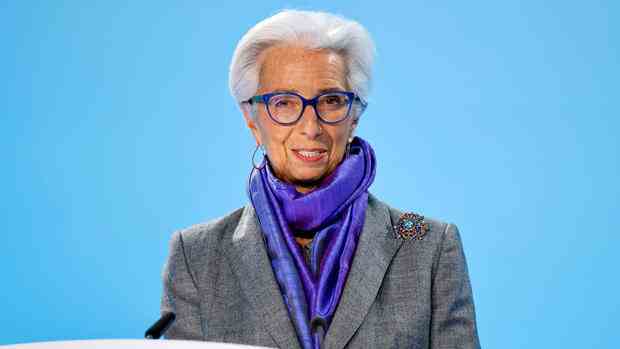The ECB President speaks in the afternoon after the central bank’s council meeting.
(Photo: IMAGO/Panama Pictures)
Frankfurt For a long time, the US Federal Reserve (Fed) was more aggressive in its rate hikes than the European Central Bank (ECB). It started tightening monetary policy earlier and has done so on a larger scale. This week, however, the picture could be reversed for the first time in a long time.
Most experts expect that the currency watchdogs in the euro zone will raise interest rates more than their American counterparts. Investors should pay particular attention to the indications that central bank chief Christine Lagarde is giving about further interest rate developments beyond February. She could also comment on inflation. The ECB will publish new forecasts in March.
The Handelsblatt summarizes the three points that matter on Thursday:
1. How much will the ECB raise interest rates?
Unlike last, the scope is relatively certain in advance. The ECB will most likely raise interest rates by 0.5 percentage points. Central bank chief Lagarde had announced several interest rate hikes of this magnitude in December. The chief economist at Dutch bank ING, Carsten Brzeski, therefore expects an increase of half a percentage point “seems to be a done deal”.
2. What happens next with interest rates?
So the more exciting question is what happens beyond February. In an interview with the Handelsblatt, ECB Director Fabio Panetta spoke out in favor of keeping further steps open. The advocates of a relaxed monetary policy, dubbed “doves”, point to the recent fall in inflation in the euro area.
ECB Director Panetta has seen some good news on the inflation side since December. He expects that energy inflation could weaken further. Recently, the prices for oil, gas and electricity have fallen significantly. Some economists expect a recession in Europe and the US. Critics therefore fear that the central banks could overreact.
On the other hand, advocates of a tighter monetary policy, such as the head of the Dutch central bank, Klaas Knot, are pushing for a further interest rate hike in March by half a percentage point. Bundesbank President Joachim Nagel also pointed out that the central bank had already announced that it would raise interest rates sharply in February and March.
The markets are currently pricing in a further increase in the deposit rate to just under 3.5 percent in July. This rate is currently two percent. After a rate hike of half a percentage point in February, the chief European economist at US bank Goldman Sachs, Jari Stehn, expects another hike of the same magnitude in March. After that, he expects an increase of a quarter percentage point in May.
3. How does the ECB assess inflation?
In addition, ECB boss Lagarde is likely to comment on inflation, even if the central bank has not yet presented any new forecasts. In December, the ECB surprisingly raised its forecast sharply. It expects a value of 3.4 percent for 2024 and a rate of 2.3 percent for 2025. This would mean that it would miss its target value of two percent for a long time.
In her press conference, Lagarde could go into what has changed since December. On Wednesday, the European statistical office Eurostat reported a significant drop in inflation to 8.5 percent in January, after 9.2 percent in December.
However, the core rate adjusted for prices for energy and food, which are particularly susceptible to fluctuations, remained at 5.2 percent – as in December. This is the highest value since the introduction of the euro. Economists like Commerzbank chief economist Jörg Krämer therefore see no reason for the ECB to give the all-clear. They point out that the price increase for energy is now being transferred to other groups of goods and that the price increase as a whole is therefore spreading more and more across all classes of goods.
More: Inflation in the euro area is falling surprisingly sharply
